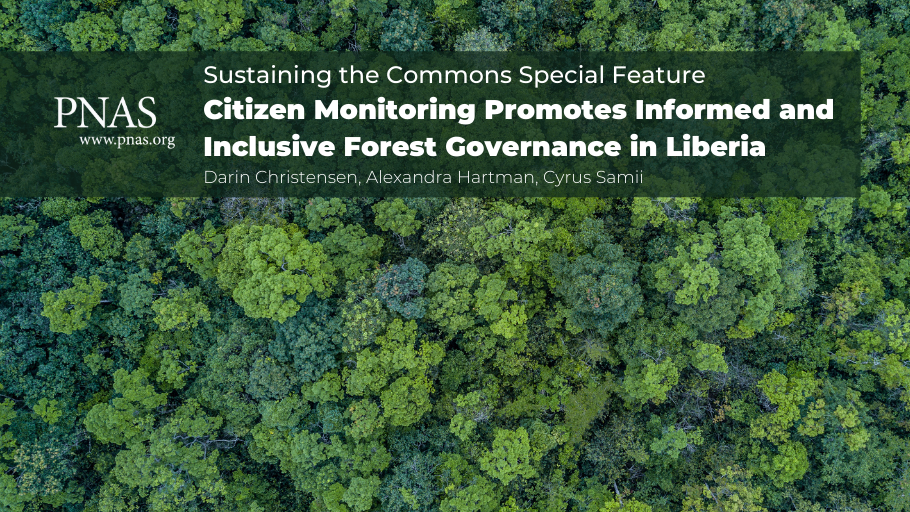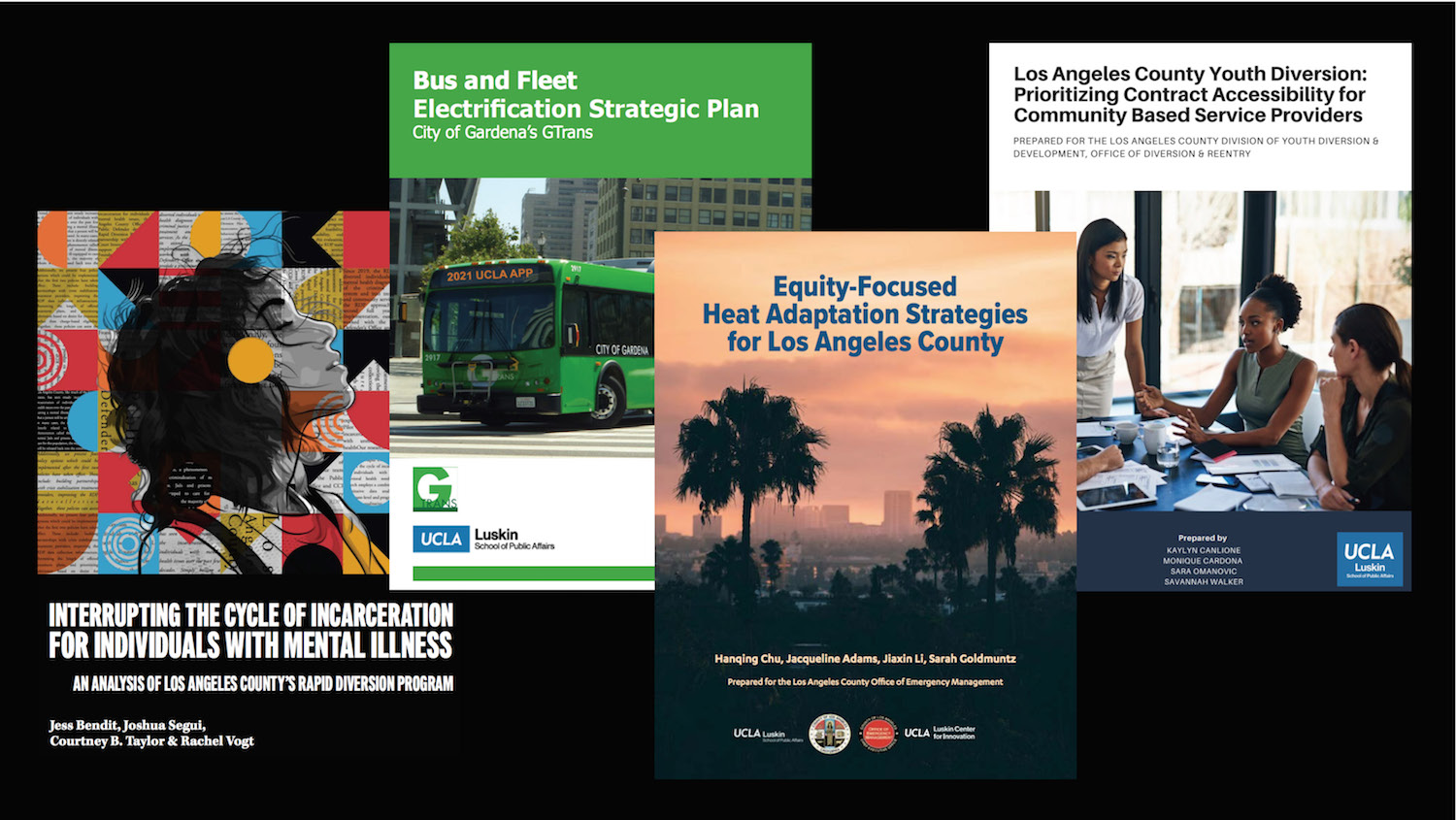Citizen Monitoring May Help Forest Conservation Globally
A UCLA-led study is part of special collection of reports released today by Proceedings of the National Academy of Sciences of the United States of America (PNAS) focused on at-risk global natural resources. The combined studies, “Sustaining the Commons,” represent the work of teams who focused their research on six regions of the world, including Africa, Amazonia and China. Each team analyzed the role that community monitoring of common-pool resources, such as forests and water, can play to support sustainable management of those natural resources. Darin Christensen, assistant professor of public policy and political science at UCLA Luskin, and his team focused on a yearlong program of community monitoring efforts in Liberia. The African nation is experiencing a relatively rapid deforestation due to timber sales and the conversion of land for small-scale and commercial agriculture, according to Christensen. “The benefits from this economic activity are not broadly distributed: Those in power amass benefits, while many Liberians see forests cleared and little compensation,” said Christensen, who worked with political scientists Alexandra C. Hartman of University College London and Cyrus Samii of New York University. “The status quo is untenable,” Christensen said. “Environmentally, it’s permanently degrading forests; socially, it’s entrenching inequality and poverty.” Christensen and colleagues found that the program helped rural communities in Liberia monitor communal forests by increasing knowledge about land management. However, the program did not decrease deforestation, suggesting that communities may need compensation to forgo forest use. “Collectively, we hope the studies demonstrate that empowering communities can help to improve the management of natural resources,” Christensen said.
UCLA Research Finds U.S. Lags Behind Other Nations in Limiting Detention of Migrant Children
The COVID-19 pandemic has amplified calls to end the detention of migrant children, as cases surge among children held in crowded conditions. Yet immigration detention’s threats to the fundamental rights of children did not begin with the current public health crisis. Unlike nearly three-quarters of high-income countries, the U.S. has no laws specifically limiting the detention of accompanied migrant and asylum-seeking children, according to a new study by the UCLA Fielding School of Public Health’s WORLD Policy Analysis Center (WORLD). Moreover, the U.S. offers minimal legal protection for unaccompanied minors, and for children who are detained, and the U.S. has no legal guarantees of access to adequate health care or education. “The U.S. lags behind when it comes to protecting the most fundamental rights of migrant children,” said Jody Heymann, a UCLA distinguished professor of public health, public policy and medicine who serves as director of WORLD. International treaties are clear that detaining children based on citizenship is a violation of human rights law. Heymann and her research team systematically coded legal restrictions on detention of child migrants in the 150 most populous United Nations-member countries, as well as literature on the costs and benefits of varying approaches to keeping such children safe and under responsible oversight. Their study, published in the International Journal of Human Rights, found that while the U.S. falls behind other high-income nations, gaps in legal protections persist across the board. “These longstanding gaps in the law have left countless children vulnerable to grave health risks and human rights violations,” Heymann said.
Storper on the Pandemic’s Lasting Impact on Cities
Urban Planning Distinguished Professor Michael Storper co-authored a paper assessing COVID-19’s anticipated impact on the economic, political and social fabric of cities for the journal Urban Studies. As the world continues to adapt to the pandemic, “we remain in a period of extended social experimentation, with households, business, the professions and the public sector all in the game,” wrote Storper and co-authors Richard Florida of the University of Toronto and Andrés Rodríguez-Pose of the London School of Economics. Throughout history, major metropolitan areas have proved resilient to epidemics and other crises and catastrophes, they wrote. “Nonetheless, even if large cities are unlikely to lose their prominent role, they will be transformed and changed — in the short term and even well after mass immunity.” The authors predict that “social scarring” based on the continued fear of coronavirus infection will continue to influence residence choice, travel and commute patterns, and the economic viability of certain businesses and social gathering spaces. The future of downtowns hangs in the balance as remote work is normalized and online shopping grows even more common. “Cities might increasingly become cultural and civic places rather than shopping destinations or office hubs,” they wrote. Despite its horrific toll, the pandemic offers a window of opportunity where cities can reset, re-energize and call old practices into question, the authors conclude. “As cities rebuild and recover, … they can pilot efforts to confront the widening chasms between classes and neighborhoods and prepare for the many threats of climate change.”
UCLA Report Highlights Inequality in Utility Debt Burden
Scholars from the UCLA Center for Neighborhood Knowledge (CNK) and UCLA Luskin Center for Innovation (LCI) collaborated on the new report “Keeping the Lights and Heat On: COVID-19 Utility Debt,” which analyzed the burden of household utility debt for many families, especially in low-income neighborhoods. The report, co-authored by CNK Director Paul Ong and LCI Associate Director Greg Pierce, used data from Pacific Gas and Electric Company (PG&E), an investor-owned utility that provides electricity and gas service to about 40% of California residents, in order to quantify the prevalence and degree of residential past-due accounts and debt. The authors explained that utility debt levels serve as a useful proxy to track households that are facing difficulties paying their rent or mortgage, particularly during economic crises. While roughly 6% of the Northern and Central California households served by PG&E are facing financial difficulties paying for most essential services, utility debt burden is highest among Black, Latino and economically vulnerable neighborhoods, the study found. PG&E recently announced that it will extend a moratorium on utility service disconnections through September 30, although many other emergency customer protections put in place during the COVID-19 pandemic have expired. The authors of the report recommend allocating funding to debt-forgiveness programs for low-income households and severely impacted neighborhoods. They plan to replicate the study in non-PG&E service areas to better understand the impact of energy and water bill debt across regions. — Zoe Day
Policy Solutions from the Newest UCLA Luskin MPPs
To earn a master of public policy degree at UCLA Luskin, students must demonstrate their command of the analytical and communication skills needed to develop real-world policy solutions. This year, 15 teams completed the rite of passage, presenting the results of their yearlong Applied Policy Project investigations into specific problems faced by a broad array of government agencies, nonprofits and other firms working in the public interest. Clients included several city and county offices; large nonprofits including the United Way and World Vision International; a nursing home in Tianjin, China; and local advocacy groups such as Coalition for Humane Immigrant Rights Los Angeles. Students are encouraged to grapple with the challenges of policy implementation amid often conflicting social, political, economic and technical interests. During three virtual sessions in May, the teams described the policy issues they tackled, reviewed their research, presented a course of action, then fielded questions from peers and professors. They also produced full reports documenting their findings, made available to clients as well as future MPP students. This year, honors were granted to four APP projects:
- Interrupting the Cycle of Incarceration for Individuals with Mental Illness (Jess Bendit, Joshua Segui, Courtney B. Taylor, Rachel Vogt)
- Bus and Fleet Electrification Strategic Plan: City of Gardena’s GTrans (George Every, Robin Kaloustian, Will Proctor, Karishma Shamdasani, Aditya Voleti)
- Equity-Focused Heat Adaptation Strategies for Los Angeles County’s Office of Emergency Management (Hanqing Chu, Jacqueline Adams, Jiaxin Li, Sarah Goldmuntz)
- Los Angeles County Youth Diversion: Prioritizing Contract Accessibility for Community Based Service Providers (Savannah Walker, Monique Cardona, Sara Omanovic, Kaylyn Canlione)
Commencement Events Bring Class of ’21 Together
UCLA Luskin honored its Class of 2021 with two days of celebrations, including an on-campus ceremony that brought classmates together after more than a year of remaining apart. The June 10 stage-crossing event felt like a class reunion for many students who completed their coursework remotely during the COVID-19 pandemic. Although some health protocols remained in place, students from the School’s public policy, social welfare, urban planning and undergraduate programs were able to gather at UCLA’s Los Angeles Tennis Center to hear their names read aloud and take photographs with Dean Gary Segura, department chairs and fellow graduates. “Today, we have so much to celebrate,” Segura told the assembled graduates. “You have accomplished, against all odds, completing your UCLA degree during a global pandemic, and we could not be prouder of you.” Formal commencement ceremonies and speeches were posted online June 11 as the Luskin School bestowed master’s and doctoral degrees — and, for the first time, the new Bachelor of Arts in Public Affairs.
View a livestream of the on-campus event on Vimeo and additional images on Flickr.
Wachs, ITS Honored with APA Planning Awards
The American Planning Association’s Los Angeles section bestowed multiple awards on the Institute of Transportation Studies at UCLA Luskin and also honored the late Martin Wachs, professor emeritus of urban planning. Wachs, who passed away unexpectedly in April 2021, received the Planning Pioneer Award for his lifelong work as a renowned transportation scholar. The Institute of Transportation Studies won the following honors:
- The Academic Award of Excellence for the paper “School Transportation Equity for Vulnerable Student Populations Through Ridehailing: An Analysis of HopSkipDrive and Other Trips to School,” authored by doctoral student Samuel Speroni and advised by Urban Planning Professor Evelyn Blumenberg
- The Academic Award of Merit for the paper “Need for Speed: Opportunities for Peak Hour Bus Lanes Along Parking Corridors in Los Angeles,” written by Mark Hansen MURP ’20.
- The Planning Landmark Award of Excellence for the UCLA Lake Arrowhead Symposium, a series of virtual sessions centering on transportation and the pandemic.
The American Planning Association is a national organization that aims to unite leaders and professionals across the field of planning. Every year, the organization’s Los Angeles section recognizes the outstanding work, best practices and thought leaders that impact the built and natural environment in Los Angeles County.— Zoe Day








